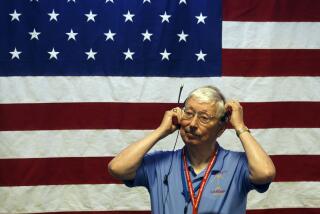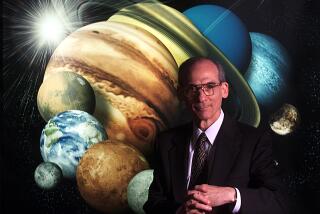Lew Allen Jr. dies at 84; retired Air Force general headed JPL for 8 years
Retired Air Force Gen. Lew Allen Jr., who during his multifaceted career headed the National Security Agency, was Air Force chief of staff and shepherded the Jet Propulsion Laboratory through a crucial period when budgets were at an all-time low and new space missions didn’t seem imminent, has died. He was 84.
Allen died Monday in Potomac Falls, Va., his family announced. No cause was given.
Allen led the laboratory in La Cañada Flintridge during a period that saw the launches of the Galileo mission to Jupiter, Magellan to Venus, the Voyager 2 flybys of Uranus and Neptune and the Infrared Astronomical Satellite to Earth orbit. But those missions were on the drawing board before his arrival.
His greatest legacy, said current JPL Director Charles Elachi, was stimulating the development of new imaging technologies that are now in use in virtually all satellites and planetary probes. Allen used internal funds to provide seed money for the development of the new devices, then was able to attract outside funding when proof of principle had been obtained.
One of his first investments was in the development of optical interferometry, which melds images from two telescopes so that interference between them reveals new information. The technology is now used at the Keck Observatory in Hawaii to detect planets circling other stars.
“People thought that was very exotic” at the time, Elachi said, “but he had the vision of putting internal funding into optical technologies that would enable” the search for extra-solar planets.
He also obtained funding to construct JPL’s microdevices lab, which Elachi said is “now one of the leading labs in the country developing very advanced detectors and nanotechnologies used in space missions. . . . They developed CCD detectors, infrared detectors, all the detectors we now fly on our missions. By developing the technology, he made JPL the leader in coming up with new missions, which made sponsors want to come to JPL because we had the capability to do it.”
The main thing about Allen that impressed him, Elachi said, was Allen’s “ability to see 10 years downstream, not only the immediate issues.”
Allen was born Dec. 30, 1925, in Miami. He graduated from the U.S. Military Academy at West Point in 1946, then joined the Air Force to crew B-52 bombers out of Carswell Air Force Base in Texas as a nuclear weapons specialist.
While still a service member, he attended the University of Illinois to earn his doctorate in physics in 1954, specializing in studies of the effects of high-altitude nuclear explosions on planes and satellites. After stints doing nuclear weapons research at the Los Alamos National Laboratory and Kirtland Air Force Base in New Mexico, he joined the Office of the Deputy Director of Defense, Research and Engineering in 1961, where he began working on classified military satellites.
Over the next 12 years in several posts, he was largely responsible for the procurement, launch and on-orbit operation of the U.S. military space fleet.
Because of his experience with spy satellites, in 1973 he was appointed a deputy to the director of the Central Intelligence Agency. Within a few months, however, President Nixon appointed him director of the National Security Agency, which is charged with overseas intelligence gathering.
During his four-year tenure, it became public knowledge that the agency had been monitoring the phone calls of some U.S. citizens in apparent contravention of existing law. During congressional hearings, Allen conceded that the agency had monitored the calls of about 1,600 citizens who were on a watch list, but argued that the monitoring had averted “a major terrorist attack” and prevented some large drug shipments from entering the country.
In response to the hearings, Congress established secret courts that could authorize domestic wiretapping for security issues.
In 1977, Allen received his fourth star -- an unusual achievement for a soldier who had never led men into battle -- and was placed in charge of the Air Force Systems Command, where he was responsible for research and development on space systems and weapons.
The next year, he became chief of staff of the Air Force and a member of the Joint Chiefs, during which time he oversaw the establishment of the Air Force Space Command. He then spent eight years at JPL.
From 1989 to 1995, he was a member of the President’s Foreign Intelligence Advisory Board and the Intelligence Oversight Board. In 1990, he led a NASA investigation into the defective mirror on the Hubble Space Telescope, an investigation that concluded that a faulty test instrument at Perkin-Elmer Corp. was responsible for the problem.
Allen is survived by his wife of 60 years, the former Barbara Frink Hatch; two sons, Lew III of Anchorage and James of London; three daughters, Barbara Miller of Annandale, Va., Marjorie Dauster of North Haven, Conn., and Christie Jameson of the Woodlands, Texas; 13 grandchildren; and 11 great-grandchildren.
More to Read
Sign up for Essential California
The most important California stories and recommendations in your inbox every morning.
You may occasionally receive promotional content from the Los Angeles Times.










